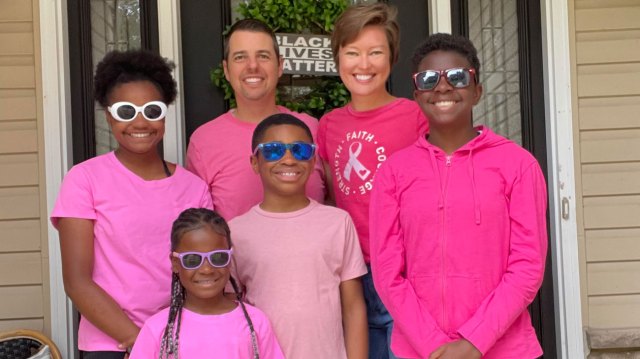When I revealed to family and friends that my child was officially diagnosed with ADHD, they offered all sorts of unsolicited, well-intended suggestions. My child just needed more discipline—such as removing all electronic time and enrolling them in martial arts class. How about trying essential oils, vitamins, and chiropractic care? The worst suggestion was that my child just needed “a good spanking” (as if there is such a thing). I was disheartened, because it’s clear that society still believes parents can somehow punish ADHD out of a child.
Even before one of my kids was diagnosed with ADHD, I knew that traditional parenting methods weren’t working. I quickly figured out that time-outs didn’t regulate their sensory meltdowns. They weren’t calmer after I reminded them of the sticker chart I’d put together. What helped my child the most, started with us, the parents. We learned about and implemented gentle, connective parenting—and it saved the day.
“Parents should make an effort to understand who their children are as people,” Dr. Sanam Hafeez, a neuropsychologist in NYC who is well-versed in ADHD, advised me. She agreed that yes, kids need the basics, like structure, rules, and boundaries, but parents also shouldn’t miss out on a key component of success: ownership. “When kids have ownership over their feelings, thoughts, and even some ‘easy’ things, like choosing a meal or what to wear on the weekends, we boost their confidence,” she says.
Gentle parenting is unconditional love and affection that co-occurs with the hard work of parenting, such as expressing what we need them to do or how we feel when they’ve made a poor decision. In our family, we found that by first getting our child regulated (a.k.a. calm), we could then have more productive conversations and outcomes. When a child’s brain goes offline, meaning they are quite upset and their feelings are far more important than reasoning, they can’t problem-solve or hear what the parent is saying.
“Gentle parenting is offering support and real-time strategies instead of punitive measures that work in the short-term but break the child’s confidence,” Dr. Hafeez says. She insists that there are simply no punishments that teach a child with ADHD how to handle their day-to-day existence with the disorder. This is where gentle parenting comes in. If we keep our child and our relationship with our child at the forefront instead of solely battling their ADHD, our child fares better.
Acceptance of an ADHD diagnosis is crucial. From Dr. Hafeez’s perspective, many parents struggle to do this because it means also accepting their own neurological or mental health struggles. If as parents we’re too focused on our own feelings, we may not be leaving space for our children to thrive. A mental health professional can assist parents in accepting their child’s—and the whole family’s—reality and step forward with tactics to meet the child’s needs.
When we’ve accepted our child’s diagnosis, as well as our own struggles, we also need to be open and honest with our children about their ADHD. Parents should assure their children that ADHD traits are not “their fault.” We need to teach our children strategies, comfort them (especially so they do not feel isolated), assure them that every person has struggles, and allow our kids to express their true feelings—including frustration. Dr. Hafeez shares that by doing these things—by connecting with our children in gentle, respectful ways—we are rewiring their brains.
Let that sink in.
For my family, learning what ADHD is and how it commonly manifests, as well as paying attention to our child’s behaviors and triggers, we felt more empowered to step forward. We also read and listened to as much about ADHD and gentle parenting as we could. We knew that authoritative parenting or avoidance wasn’t going to help us or our child.
Certainly, love and respect aren’t enough. Kids with ADHD need very practical tools and strategies to accomplish tasks, such as homework or cleaning their room. Their executive functioning can be years behind their typically developing peers, so a child with ADHD who is nine might behave more like a six-year-old. Parents need to parent the child they have. The child will likely need to focus on skills such as time management and organization. A visual timer, chunking bigger tasks into smaller tasks, and labeling can be helpful, according to Dr. Hafeez. In our home, we use a lot of visual schedules.
Dr. Hafeez reminded us that kids who have ADHD “often have overlapping or conflating conditions,” which include anxiety and learning disabilities. We learned that we needed to approach our children with ADHD plus other conditions with the same level of respect, education, and guidance. Does this take work? Yes. A lot of it. However, the alternative is a constant stage of combativeness that can not only dysregulate the child and parent but the entire household.
There are multiple ways parents can help their child with ADHD, and we found that utilizing all of them was the best approach. Changing our parenting alone wasn’t enough to help our child. Therapy, medication, lots of gross motor activity, an appropriate school plan, and ongoing education have all been immensely beneficial.
If you’re a parent who feels lost when it comes to parenting your child with ADHD, you aren’t alone. In our family, changing our approach from more authoritarian to gentler parenting has changed our lives for the better. We face far fewer battles and have experienced far more joy.











